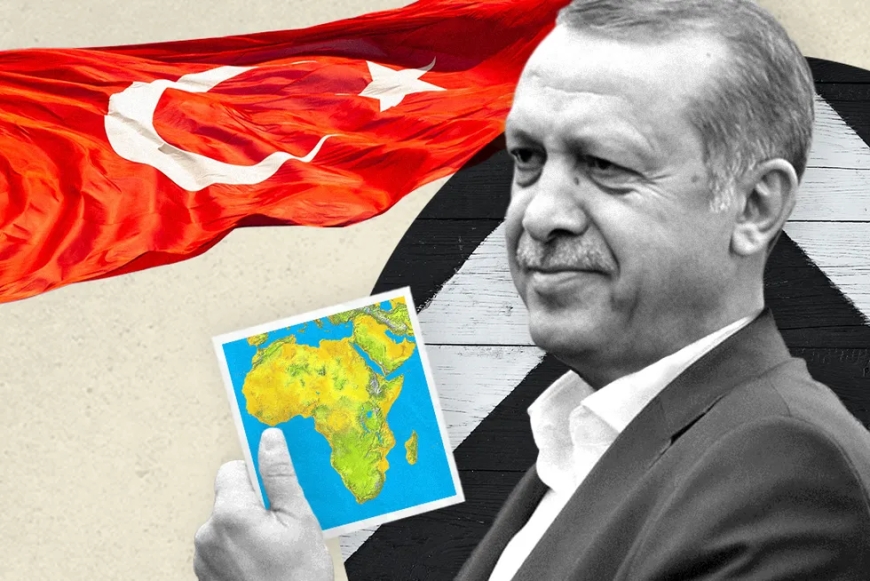Turkey's Expanding Ambitions: A Critical Analysis of Its Geopolitical Strategies in Africa

By: A. Mahdavi
The African continent has emerged as a crucial arena in international relations, where global powers vie for supremacy. Africa's abundant natural and mineral resources make it an enticing destination; Meanwhile Turkey has eagerly embraced this opportunity. But does Ankara’s engagement in Africa stem from a genuine intention to collaborate, or is it merely an expansion of its ambitious geopolitical objectives?
With its abundant reserves of natural resources Africa has captured the attention of global superpowers in recent years, becoming a region of significant interest. Turkey, aiming to enhance its soft influence, has actively engaged instead of passively observing in this competitive environment. Since 2005, Turkey has greatly increased its presence in Africa demonstrating its strategic ambitions.
The signing of a strategic cooperation agreement with the African Union in 2008 marked a major achievement for Turkey. This agreement was more than just a symbolic gesture; it was a deliberate effort to deepen Turkey's integration into the African geopolitical framework. The rapid increase in the number of Turkish embassies, from 12 to 40 in less than two decades, demonstrates Turkey's dedication to establishing a prominent presence and exerting its influence across the continent. This is further emphasized by the impressive growth in trade volume, which went from approximately $5 billion to over $20 billion.
In addition to diplomatic and economic overtures Turkey has intensified its focus on humanitarian activities in Africa. The Turkish Cooperation and Coordination Agency (TIKA) is instrumental in this regard, as it carries out aid and development projects across the continent. Through these empathetic initiatives, Turkey is striving to enhance its image as a compassionate ally, aiming to build trust and establish itself as a champion for the African people and a conscientious global contributor.
Turkey's intention to redefine its position in the international system is evident in its multifaceted approach to partnering with African nations. With a wide array of partnerships in energy, infrastructure, culture, education, and military, Ankara is working towards becoming a significant player in the African arena. Turkey's agreements with countries such as Niger, Nigeria, Tanzania, Algeria, South Africa, Libya, and Somalia showcase its commitment to becoming an integral part of Africa's economic and political landscape.
Turkey's strategy is evident through its active engagement in East Africa, which includes an oil extraction agreement with war-torn Somalia. This agreement enables Turkey to conduct extensive exploration and extraction of resources along Somalia's coast, bolstering Turkey's energy portfolio and strategically positioning it in a region of increasing geopolitical importance. The collaboration with the United States in this venture brings an additional level of complexity to the situation, showcasing Turkey's expertise in handling intricate international partnerships for its advantage.
As Turkey forges ahead in Africa, the nature of its involvement remains open to interpretation. Is it driven by a sincere desire for collaboration and mutual growth, or is it a reflection of broader geopolitical ambitions? In pondering Turkey's expanding influence, one might recall the timeless wisdom of Lord Acton: "Power tends to corrupt, and absolute power corrupts absolutely." As Turkey seeks to broaden its impact, the question remains—will its efforts foster lasting alliances, or will they complicate Africa’s already intricate geopolitical landscape?
Nevertheless, Turkey's ambitious strategies come with inherent risks. The dynamic and occasionally unpredictable nature of African geopolitics poses challenges to Turkey's efforts to safeguard its interests. The success of Turkey's ambitious plan is contingent on effectively navigating geopolitical tensions and meticulously maintaining a delicate equilibrium between its partnerships with African nations and other major global players.
As Turkey explores its engagement in Africa, it raises questions about the nature of its involvement—is it driven by a genuine desire for collaboration and partnership, or does it reveal ambitious geopolitical aspirations? Reflecting on Turkey’s expanding influence, one might consider the adage, "The road to hell is paved with good intentions." As Turkey seeks to broaden its impact, it will be crucial to determine whether its actions will lead to lasting partnerships or if they will add layers of complexity to Africa’s already intricate geopolitical dynamics.












































